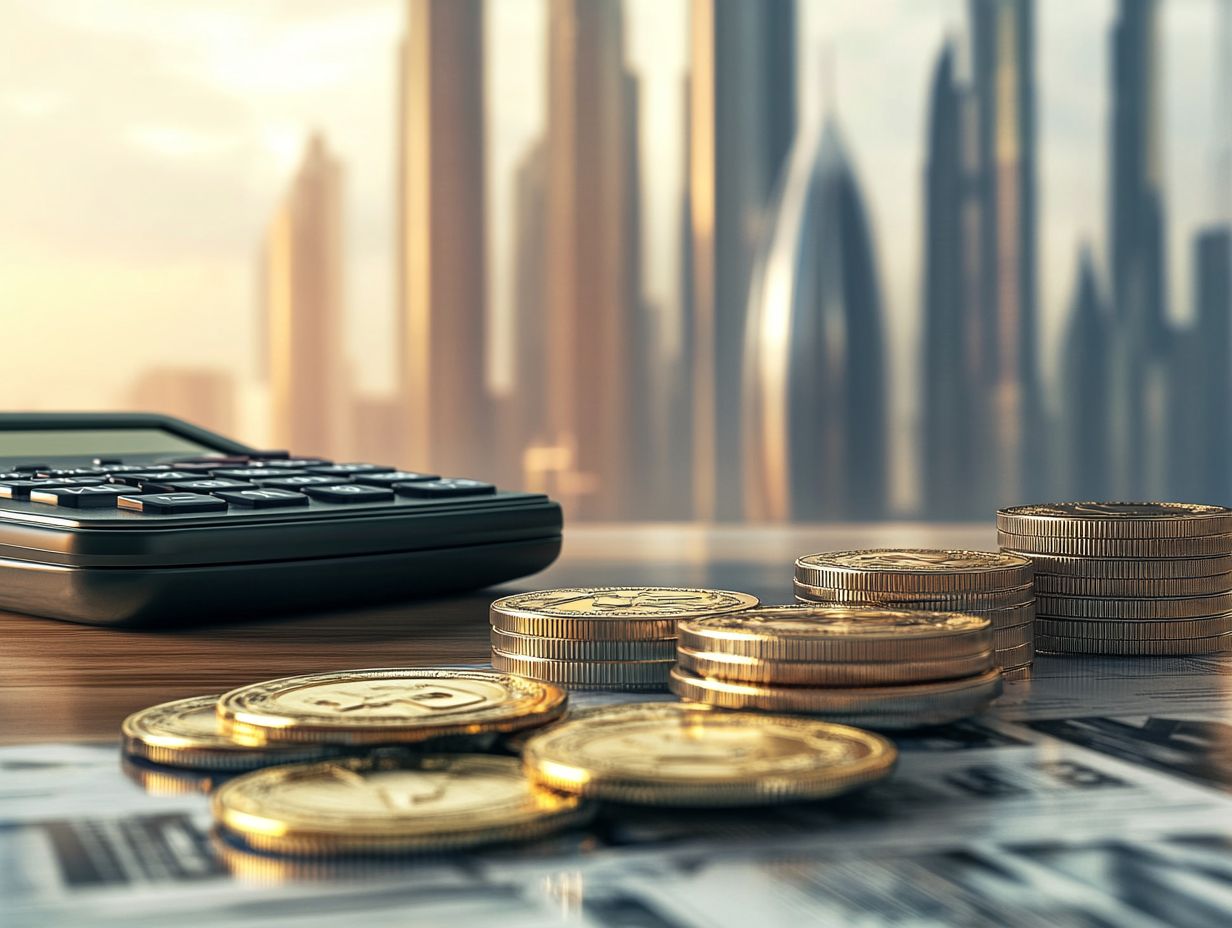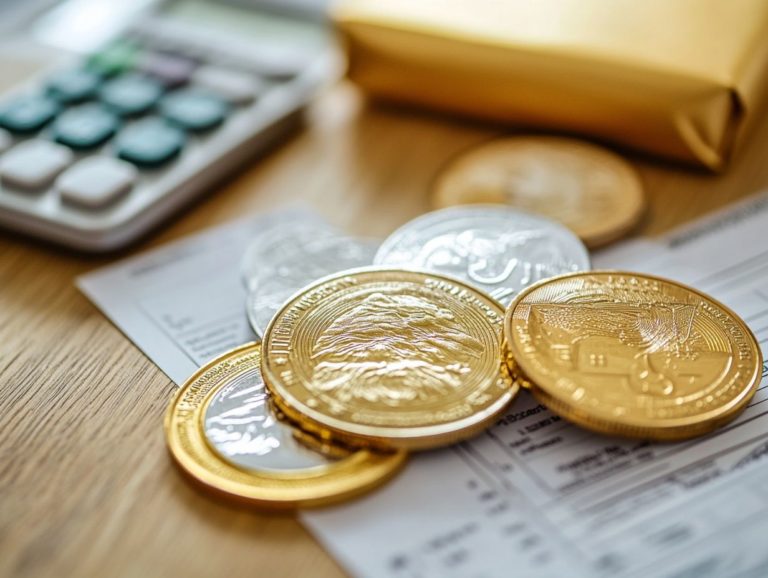The Future of Taxation in Precious Metals Investment
Investing in precious metals has long been regarded as a savvy strategy for safeguarding your wealth and diversifying your portfolio.
Grasping the intricacies of the taxation that accompanies these investments is essential for optimizing your returns. This exploration delves into the various types of precious metals, the current tax laws impacting investors like you, and potential changes that could reshape the investment landscape.
You ll also uncover technological advancements that streamline tracking and reporting, along with strategies designed to minimize your tax burdens. The guide also provides predictions for future taxation within this ever-evolving market.
Whether you re a seasoned investor or just beginning your journey, this guide is packed with insights that will empower you to navigate the complex world of precious metals taxation with confidence.
Contents
- Key Takeaways:
- Current Taxation Laws for Precious Metals Investment
- Proposed Changes to Taxation in Precious Metals Investment
- The Role of Technology in Taxation of Precious Metals
- Strategies for Minimizing Taxation on Precious Metals Investment
- The Future of Taxation in Precious Metals Investment
- Frequently Asked Questions
- What is the current tax system for precious metals investment?
- Will the tax system for precious metals investment change in the future?
- What exciting changes to the tax system could be on the horizon?
- How might changes to the tax system affect my investments?
- Could taxation on precious metals investment be eliminated altogether?
- Are there any tax advantages for investing in precious metals?
Key Takeaways:

- Current taxation laws for precious metals investment vary by type and can significantly impact overall returns.
- Proposed changes to taxation in precious metals investment could potentially affect investors by altering tax rates and regulations.
- Advancements in technology are making it easier to track and report precious metals investments, potentially impacting future taxation policies.
Types of Precious Metals and Their Uses
Investing in precious metals like gold, silver, and platinum has become a savvy strategy for building wealth and securing your financial future. These asset classes offer a multitude of uses, from stunning jewelry to essential industrial applications.
They can be invested in through gold coins and bars that you can hold physically or via financial instruments. Gold IRAs elevate the allure of precious metals, providing you with tax-efficient retirement savings options.
Beyond gold, silver and platinum hold significant importance across various industries. Silver is a crucial component in electronics and solar panels.
Meanwhile, platinum plays an essential role in catalytic converters for vehicles. This multi-faceted nature of precious metals means their value isn’t merely a product of market speculation.
If you’re considering diversifying your portfolio, platinum bars or silver bullion coins present enticing opportunities.
By incorporating gold IRAs into your investment strategy, you can tap into the long-term appreciation potential of these valuable resources while enjoying tax benefits.
This makes them a compelling choice for safeguarding your wealth against inflation and economic downturns.
Current Taxation Laws for Precious Metals Investment
Understanding the tax laws related to precious metals investment requires a keen understanding, as these regulations vary significantly across different asset classes like physical gold, silver investments, and ETFs.
You must carefully consider the IRS regulations the rules set by the Internal Revenue Service that affect how you report your investments that dictate the tax implications of buying, selling, and holding these assets.
The specific reporting requirements can profoundly impact your overall tax liability, making it essential to stay informed and strategic in your investment approach.
Tax Rates and Regulations
Understanding tax rates and regulations for investing in precious metals is crucial for you to maximize your investment returns and minimize your tax liability. The IRS treats profits from the sale of precious metals, such as gold and silver, under capital gains tax.
This can differ significantly based on whether these profits are considered collectibles or ordinary income, which ultimately impacts your short-term and long-term gains.
You should be aware that short-term gains those realized from assets held for one year or less are taxed at ordinary income rates, which can be considerably higher than the rates for long-term capital gains.
On the other hand, long-term gains occur when you hold your investments for more than a year, allowing you to benefit from reduced tax rates that generally favor more patient investors.
Specifically, the IRS classifies precious metals as collectibles, which means these gains are subject to a maximum tax rate of 28%. This is in contrast to the lower rates available for other capital assets.
Therefore, it’s essential for you to devise a strategy that aligns your holding periods with your financial goals, enabling you to adeptly navigate the complexities of taxation in this lucrative market.
Proposed Changes to Taxation in Precious Metals Investment

Proposed changes to taxation regarding precious metals investment are increasingly capturing attention, particularly amid the backdrop of ongoing economic uncertainty.
These potential shifts could fundamentally alter how you strategize your portfolio, impacting everything from tax relief opportunities to the broader tax implications linked to various investment vehicles, including gold IRAs and physical assets.
Potential Impact on Investors
The potential impact of proposed tax changes on your investments in precious metals could be substantial, influencing your overall investment returns and strategies for financial growth.
It s essential for you to understand how these changes will affect tax implications especially if you re utilizing tax-efficient vehicles like precious metals IRAs. This knowledge will be crucial for effective wealth management.
Stay agile as these legislative adjustments unfold. Carefully assess how shifts in tax rates and regulations might reshape the landscape of your portfolio.
You might discover that traditional investment strategies, which have served you well in the past, now require reevaluation to enhance tax efficiency and protect your returns.
Precious metals, frequently viewed as a protection against rising prices and market volatility, could become increasingly vital in your diversified asset allocation. By understanding the tax landscape for precious metals in the next decade, you can take charge of your financial future!
The Role of Technology in Taxation of Precious Metals
Technology serves as a vital cornerstone in the taxation of precious metals, providing smart tools for tracking and reporting investment activities, all of which are crucial for adhering to IRS regulations.
Advanced documentation tools not only streamline accurate transaction reporting but also empower you to maintain a current understanding of your assets market value.
Advancements in Tracking and Reporting
Recent advancements in tracking and reporting technology have equipped you with essential tools to navigate the intricacies of IRS regulations surrounding precious metals.
These innovations simplify transaction reporting, making compliance easier and paving the way for potentially increased financial growth through more strategic investment management.
For instance, specialized software now enables you to automatically track your gold futures and other gold or silver bars or coins valued by their metal content in real-time, offering a comprehensive view of your portfolio.
Cloud-based platforms further enhance accessibility, allowing you to generate detailed reports that effortlessly meet IRS requirements. These tools not only lighten the load of manual record-keeping but also empower you to make well-informed decisions based on accurate data.
Ultimately, maintaining compliance while optimizing your investments in precious metals has never been easier, unlocking the door to greater financial opportunities.
Strategies for Minimizing Taxation on Precious Metals Investment

Developing effective strategies to minimize taxation on your precious metals investments is crucial for maximizing your net returns and enhancing your overall wealth accumulation.
You should consider utilizing tax-efficient vehicles like gold IRAs and take advantage of available tax deductions. Consulting with financial advisors can significantly optimize your investment strategies, ensuring you make the most of your portfolio.
Act now to stay ahead of these changes and secure your financial future!
Tips for Reducing Your Tax Burden
Implementing targeted tips can significantly reduce the tax burden on your precious metals investments. This can enhance your financial stability.
Select tax-efficient investment options to make the most of your capital. Mindfully managing storage fees can also help.
Explore tax-deferred accounts to extend your investment capital’s lifespan. Be aware of capital gains taxes when selling assets, so you can minimize tax exposure.
Consider low-cost storage solutions to ease financial pressure. Stay updated on changing tax laws to adapt your strategies.
The Future of Taxation in Precious Metals Investment
The future of taxation in precious metals investment presents an uncertain landscape. This is influenced by shifting regulations and economic factors.
It’s essential to remain informed about potential changes in tax implications. This knowledge allows you to adapt your investment strategies accordingly.
By staying proactive, you can navigate this unpredictable terrain with greater confidence and finesse.
Predictions and Speculations
Predictions and speculations about the future of taxation in precious metals investment are swirling around the investment landscape. This is particularly true in this era of economic uncertainty.
Analysts suggest that shifts in regulatory frameworks could lead to new tax implications. It’s important to prepare for these changes strategically.
This evolving situation has sparked discussions among experts about potential changes that could significantly influence market dynamics. For instance, increased capital gains taxes on gold and silver could discourage speculative investments.
Conversely, tax incentives for long-term holdings might foster greater stability within the sector. The introduction of stricter reporting requirements could enhance transparency but may also burden smaller investors.
As these factors interact, staying informed will be crucial. This ensures you adapt your strategies and effectively navigate the complexities of future taxation.
Frequently Asked Questions
What is the current tax system for precious metals investment?
Currently, precious metals investment is subject to capital gains tax. This varies depending on the type of metal and the duration of holding.
Will the tax system for precious metals investment change in the future?
It’s possible that the tax system for precious metals investment will change. Governments continuously reassess their tax policies as the market for precious metals evolves.
What exciting changes to the tax system could be on the horizon?
Some proposed changes to the tax system for precious metals investment include eliminating or reducing capital gains tax. Other ideas include implementing a flat tax rate for all metals or creating a special tax rate for precious metals.
How might changes to the tax system affect my investments?
Potential changes to the tax system for precious metals investments could significantly impact profitability. It’s important to stay informed and consult with a financial advisor to understand how these changes may affect you.
Could taxation on precious metals investment be eliminated altogether?
While it’s unlikely that taxation on precious metals investment will be completely eliminated, certain metals or investment strategies may become exempt from capital gains tax in the future.
Are there any tax advantages for investing in precious metals?
Some countries offer tax advantages for investing in precious metals. This includes tax-free bullion sales or tax deductions for investing in certain metals. It’s vital to research and understand the tax laws in your country before making investment decisions.














